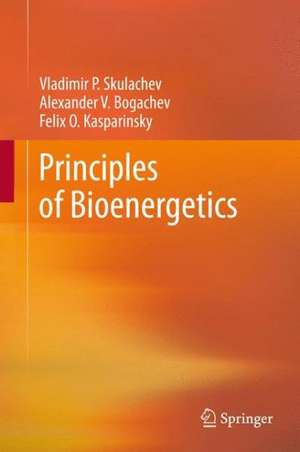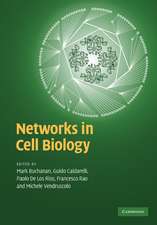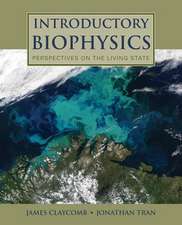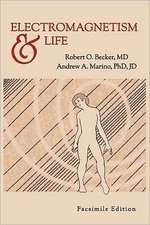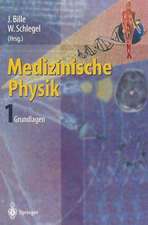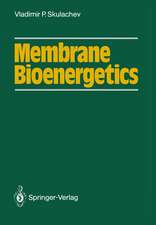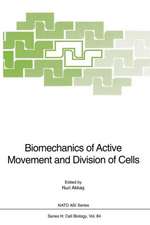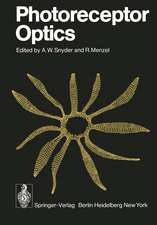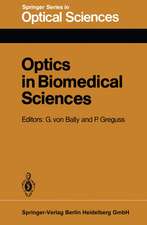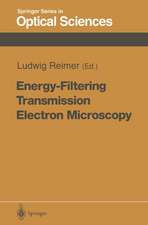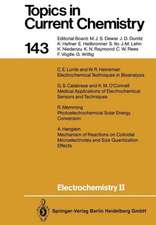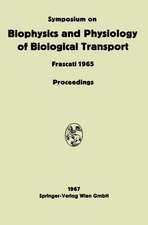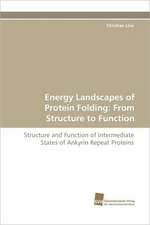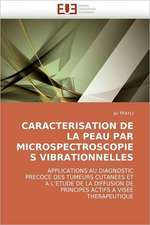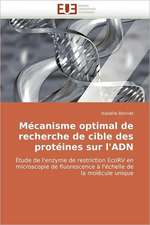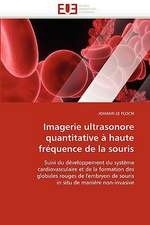Principles of Bioenergetics
Autor Vladimir P. Skulachev, Alexander V. Bogachev, Felix O. Kasparinskyen Limba Engleză Hardback – 15 dec 2012
| Toate formatele și edițiile | Preț | Express |
|---|---|---|
| Paperback (1) | 648.05 lei 6-8 săpt. | |
| Springer Berlin, Heidelberg – 29 ian 2015 | 648.05 lei 6-8 săpt. | |
| Hardback (1) | 655.60 lei 6-8 săpt. | |
| Springer Berlin, Heidelberg – 15 dec 2012 | 655.60 lei 6-8 săpt. |
Preț: 655.60 lei
Preț vechi: 771.30 lei
-15% Nou
Puncte Express: 983
Preț estimativ în valută:
125.46€ • 130.24$ • 104.62£
125.46€ • 130.24$ • 104.62£
Carte tipărită la comandă
Livrare economică 22 martie-05 aprilie
Preluare comenzi: 021 569.72.76
Specificații
ISBN-13: 9783642334290
ISBN-10: 3642334296
Pagini: 452
Ilustrații: XVI, 436 p.
Dimensiuni: 155 x 235 x 30 mm
Greutate: 0.84 kg
Ediția:2013
Editura: Springer Berlin, Heidelberg
Colecția Springer
Locul publicării:Berlin, Heidelberg, Germany
ISBN-10: 3642334296
Pagini: 452
Ilustrații: XVI, 436 p.
Dimensiuni: 155 x 235 x 30 mm
Greutate: 0.84 kg
Ediția:2013
Editura: Springer Berlin, Heidelberg
Colecția Springer
Locul publicării:Berlin, Heidelberg, Germany
Public țintă
ResearchCuprins
Part I: General Aspects of Bioenergetics: Introduction.- Part II: Generators of Proton Potential: Chlorophyll-Based Generators of Proton Potential.- Organotrophic Energetics.- The Respiratory Chain.- Structure of Respiratory Chains of Procaryotes and Mitochondria of Protozoa, Plants, and Fungi.- Bacteriorhodopsin.- Part III: Consumers.- Driven Chemical Work.- Driven Mechanical Work: Bacterial Motility.- Driven Osmotic Work.- Energy Source for Heat Production.- Part IV Interaction and Regulation of Proton Potential Generators and Consumers: Regulation, Transmission, and Buffering of Proton Potential.- Part V The Sodium World: Generators.- Part VI Mitochondrial Reactive Oxygen Species and Mechanisms of Aging: Concept of Aging as a Result of Programmed Slow Poisoning of Organism with Mitochondrial Reactive Oxygen Species.- Possible Medical Applications of Membrane Bioenergetics: Mitochondria-Targeted Antioxidants as Geroprotectors.- Appendices.
Recenzii
From the reviews:
“Outlining recent advances in our understanding of bioenergetics, this book discusses structures and molecular mechanisms involved in energy transduction, as well as alternative functions of mitochondria. … The audience includes graduate students, postdoctoral fellows, and researchers in biochemistry, biophysics, cellular and molecular biology, chemistry, physiology, and toxicology. … This book eloquently presents the current concepts of bioenergetics while providing a historical perspective of the field. It is thorough in its presentation of the information and complete in its coverage.” (Sophie La Salle, Doody’s Book Reviews, January, 2014)
“Outlining recent advances in our understanding of bioenergetics, this book discusses structures and molecular mechanisms involved in energy transduction, as well as alternative functions of mitochondria. … The audience includes graduate students, postdoctoral fellows, and researchers in biochemistry, biophysics, cellular and molecular biology, chemistry, physiology, and toxicology. … This book eloquently presents the current concepts of bioenergetics while providing a historical perspective of the field. It is thorough in its presentation of the information and complete in its coverage.” (Sophie La Salle, Doody’s Book Reviews, January, 2014)
Textul de pe ultima copertă
Principles of Bioenergetics summarizes one of the quickly growing branches of modern biochemistry. Bioenergetics concerns energy transductions occurring in living systems and this book pays special attention to molecular mechanisms of these processes. The main subject of the book is the "energy coupling membrane" which refers to inner membranes of intracellular organelles, for example, mitochondria and chloroplasts. Cellular cytoplasmic membranes where respiratory and photosynthetic energy transducers, as well as ion-transporting ATP-synthases (ATPases) are also part of this membrane. Significant attention is paid to the alternative function of mitochondria as generators of reactive oxygen species (ROS) that mediate programmed death of cells (apoptosis and necrosis) and organisms (phenoptosis). The latter process is considered as a key mechanism of aging which may be suppressed by mitochondria-targeted antioxidants.
Caracteristici
Comprehensive up-to-date treatment of molecular bioenergetic mechanisms Authors are the inventors of this branch within modern biology Written also for advanced undergraduate and graduate students in biophysics, biology and medicinal chemistry Includes supplementary material: sn.pub/extras
